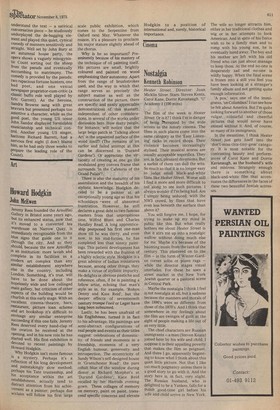Cinema
Nostalgia
Kenneth Robinson
Hester Street. Director: Joan Micklin Silver. Stars: Steven Kents, Carol Kane, Dorrie Kavanaugh. `LY Academy 1(100 mins) The film of the week is Hester Street. Or is it? I think I'm in danger of being hrrupted by the wide screen in the luxury cinema. The films in such places come into the same category as the 'Easy Listening' racks in record shops. Their violence becomes increasingly stylised. Their musical scores are usually acceptable soporifics. They are, in fact, pleasant diversions. But a surfeit of them can dull the wits. So much so that it is no longer easy to judge small black-and-white films like Hester Street. Worse still I find it more and more difficult to toil along to see such pictures. I always wonder if I'm being had. Am I simply being seduced, with the NW3 crowd, by films that have even less beneath the surface than above it?
You will forgive me, I hope, for trying to make up my mind in public like this. But what really bothers me about Hester Street is that it stirs me up into a nostalgic wallow without doing much else for me. Maybe it's because of the haunting music from the turn of the century. This plastered on to the film — in the form of Winter-Garden cornet solos or piano rags — while the director stages visual interludes. For these he uses a street market in the New York Jewish quarter or a pastoral scene in Central Park.
Maybe the nostalgia I think I feel is not nostalgia at all, but a sadness because the manners and morals of the 1890's were so different from those of the 1970's. And I think that somewhere in my feelings about the film are twinges of guilt at the sight of people making a life out of so very little.
The chief characters are Russian immigrants — a man (Steven Keats) joined later by his wife and child. I suppose it is their appalling poverty that makes the film so poignant. And there I go, apparently beginning to know what I think about this quiet little picture. Not that I like too much poignancy unless there is a good story to go with it. And the story here is, in fact, very slight. The Russian husband, who is delighted to be a Yankee, falls for a Polish good-time girl before his wife and child arrive in New York. The wife no longer attracts him, either in her traditional clothes and wig or in her attempts to look American. And in spite of his fierce, wish to be a family man and to romp with his young son, he is eventually lured away. The boy and his mother are left with his old friend who can just about manage to keep them. At the end no-one is desperately sad and no-one is wildly happy. When the final scene is frozen into a still you feel you have been looking at a stranger's family album and not getting quite enough information.
'A pox,' says one of the immigrants, 'on Columbus.' I can see how he felt about America. But I'm quite looking forward to another of those vulgar, colourful and cheerful pictures that would never have existed without it. And, of course, so many of its immigrants.
In the meantime, I think Hester Street just gets itself into the 'don't-miss-this-tiny-gem' category. It is most notable for the contrasting beauty and performances of Carol Kane and Dorrie Kavanaugh, as the husband's wife and mistress. Strangely enough there is something about black-and-white film that accentuates the differences in the faces of these two beautiful Jewish actresses.
































 Previous page
Previous page